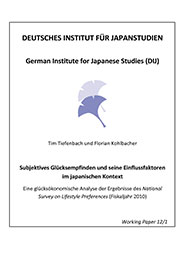
Download
Details
2012, Deutsches Institut für Japanstudien, Tokyo, 45 p.Authors
Tiefenbach, Tim
Subjektives Glücksempfinden und seine Einflussfaktoren im japanischen Kontext: Eine glücksökonomische Analyse der Ergebnisse des National Survey on Lifestyle Preferences (Fiskaljahr 2010)

Happiness economics has become an established field of research and happiness and life satisfaction are increasingly considered important policy goals by governments around the globe. The Japanese government acknowledges this trend by regularly collecting data on personal happiness and its determinants through nationwide surveys. This paper has two purposes. First, it provides a comprehensive overview of the state of the field of happiness economics in Japan by also drawing on the literature published in Japanese in addition to publications in international journals. Second, the paper analyses data from the fiscal year 2010 National Survey on Lifestyle Preferences to determine the factors correlated with personal happiness in Japan. Overall, results confirm relationships established by previous studies in the field of happiness economics, such as the correlation between income and happiness. In addition, this study also provides new insights into relationships which have been neglected by previous research, such as the negative impact of perceived loneliness. As the survey was conducted at the end of fiscal year 2010 in March 2011 it also provides the unique opportunity to check whether responses differ before and after the Great East Japan Earthquake of March 11. Results indicate that happiness decreases slightly after March 11, although this effect disappears when controlling for prefectures.